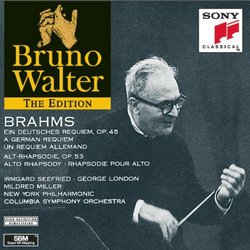| All Artists: George London, Johannes Brahms, Bruno Walter, Mildred Miller, New York Philharmonic, Westminster Choir, Columbia Symphony Orchestra, Irmgard Seefried Title: Johannes Brahms: Ein Deutsches Requiem, Op. 45/Alt-Rhapsodie, Op. 53 Members Wishing: 0 Total Copies: 0 Label: Sony Release Date: 5/16/1995 Genre: Classical Styles: Opera & Classical Vocal, Historical Periods, Early Music, Modern, 20th, & 21st Century Number of Discs: 1 SwapaCD Credits: 1 UPC: 074646446928 |
Search - George London, Johannes Brahms, Bruno Walter :: Johannes Brahms: Ein Deutsches Requiem, Op. 45/Alt-Rhapsodie, Op. 53
 | George London, Johannes Brahms, Bruno Walter Johannes Brahms: Ein Deutsches Requiem, Op. 45/Alt-Rhapsodie, Op. 53 Genre: Classical
|
Larger Image |
CD Details |
CD ReviewsA Brahms Requiem with Life tvarley@frontiernet.net | Otisville, NY | 04/04/1999 (5 out of 5 stars) "For some reason, the farther we get from Brahms' own lifetime, the slower performances of his music seem to get. Compare the symphonies as performed by conductors like Weingartner, who met Brahms and heard him perform with modern day performances by Karajan, Abbado and Muti.Bruno Walter is a case in point. His late Columbia Symphony stereo set of the symphonies slowed somewhat from his firey New York Philharmonic cycle of the early 1950s but # 2 and 3 are still among the finest available and have a sense of naturalness missing from some of the others cited. Slow Brahms too much and you lose the backbone, the sense of forward motion and end up with a rather heavy lumpish piece of music. The rhythmic vitality that is an integral part of his thought is lost.No work has suffered more at the hands of those who slow Brahms down at the alter of being one of the Great Composers than the German Requiem. A Requiem can be meditative and moving without being slow. Walter's 1954 recording clocks in at around 62 minutes, about the same as a Toscanini broadcast from the 1940s and Ormandy's studio recording of the early 1960s. The norm these days seems to be closer to 75 minutes (Prevun, Haitink, Karajan, et. al.). And what a difference those 13 minutes make. Here there is a real sense of triumph in the fugue of the next to the last movement. Death is conquered, make no mistake. This is a wonderful performance that languished in the Columbia (now Sony vaults) for 18 years, until finally being released in 1972. Apparently Walter was disturbed by few flubs that were not corrected with retakes and then, too, this came at the very end of the mono era and Columbia was behind RCA in experimenting with stereo. No matter. The sound is warm, as is the performance. Get it!" A Last Memento of a Brilliant Conductor Grady Harp | Los Angeles, CA United States | 12/10/2004 (5 out of 5 stars) "Bruno Walter was not only one of the very finest conductors of both symphony and opera in the 20th Century, he was an unassuming poet whose every thought and gesture was about the composers' intentions. On the podium he was revered by orchestras and singers and choruses and always demanded (and got) as close to perfection as the moment allowed. This recording of the Brahms Ein Deutsches Requiem is holy and the contributions by the chorus and the soloists are understated in the way that Walter achieved his most profound effect. It is in the accompanying "Alto Rhapsody" for Mezzo Soprano, men's chorus, and orchestra that the essence of this great man can be most securely felt. In the early 1960s, knowing that Bruno Walter would not live much longer, John McClure of Columbia Records assembled the 'Columbia Symphony Orchestra' - musicians drawn form the finest of the studio musicians in Los Angeles - and set up a recording site in the American Legion Hall next to the Hollywood Bowl where he facilitated such recordings as this Alto Rhapsody, Brahms 'Schicksalslied', Wagner, Mahler, and others. Bruno Walter himself auditioned choruses for these recordings and elected to engage the Occidental College Concert Choir as trained by Howard Swan to sing the choral elements. For the Mezzo he chose the underrated Mildred Miller. The result is as perfect a concept of the Alto Rhapsody ever recorded. Originally this work was released with Brahms' "Schicksalslied" and Mahler's "Lieder eines fahrenden Gesellen". Would that that old CD be available still. The experience of making music with the mighty but gentle Bruno Walter is an unforgettable experience for performers and audiences. Warm memories of being in the chorus for the Alto Rhapsody will always be among the most treasured in my musical experiences. This is a recording for the ages. Grady Harp, December 2004" One of Walter's Finest Timothy Dougal | Madison, Wi United States | 03/14/2002 (5 out of 5 stars) "I bought this disc out of a sense of frustration with modern performances that left me wondering as I listened, "Is it almost over yet?". Even John Eliot Gardiner's celebrated 'excavation' of the piece didn't remove that feeling. At least this version was short! (about 60 min.) I'm really happy I made the switch. The sound is mono, so it may be disappointing to some listeners, but the quality of the performance is so warm, passionate and well thought out and felt, so utterly cohesive, that I don't think anyone could be disappointed with the performance. The "Alto Rhapsody" was recorded later in stereo, (with a higher volume level) and is wonderful all around."
|

 Track Listings (8) - Disc #1
Track Listings (8) - Disc #1